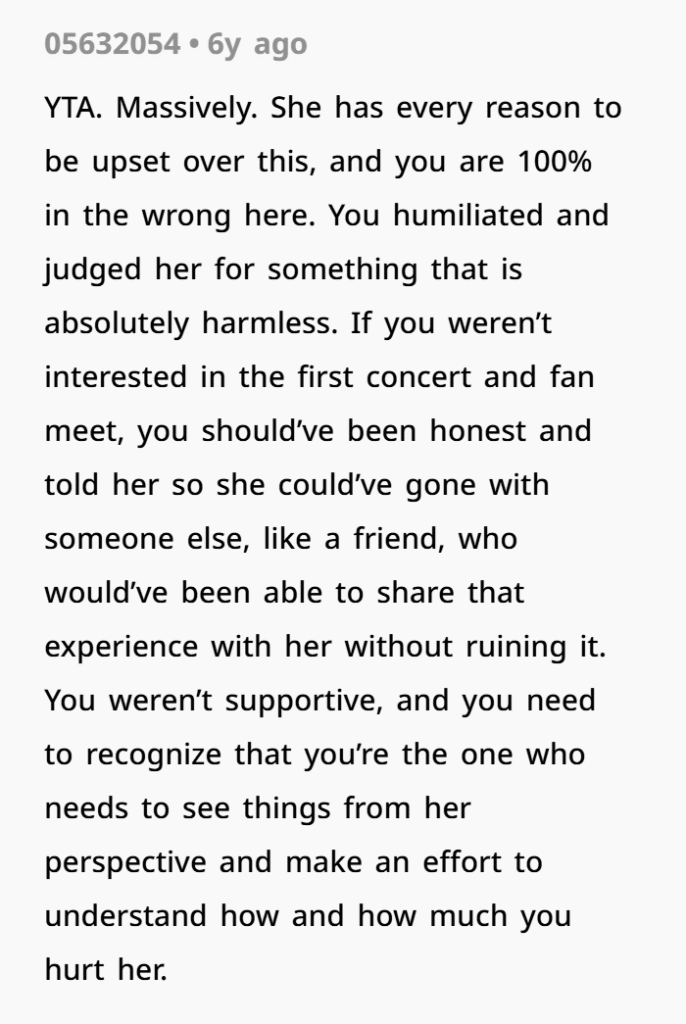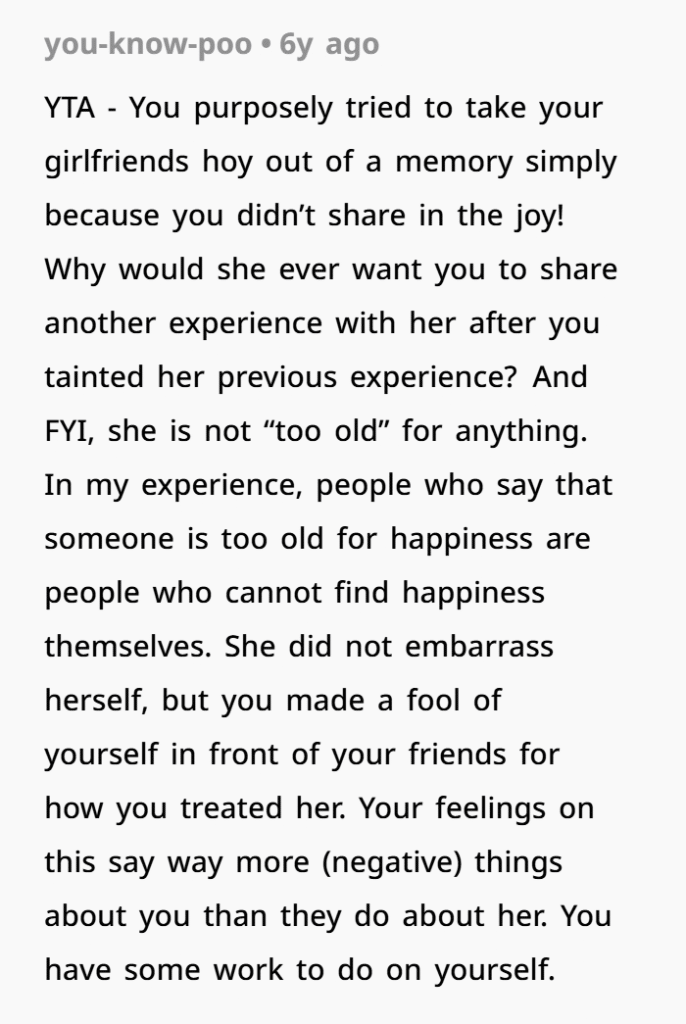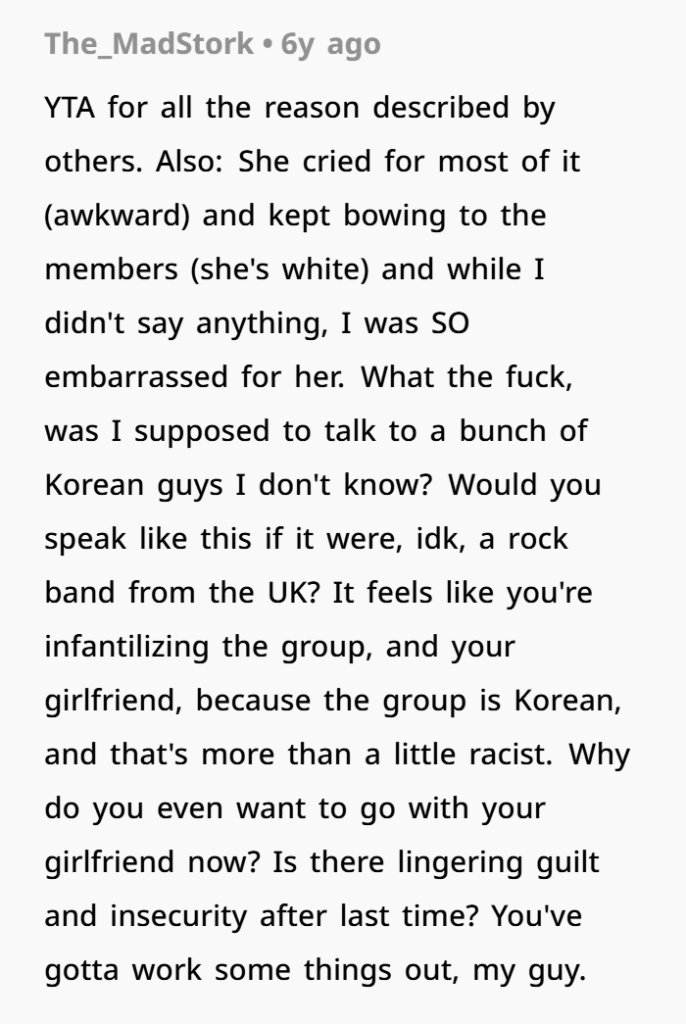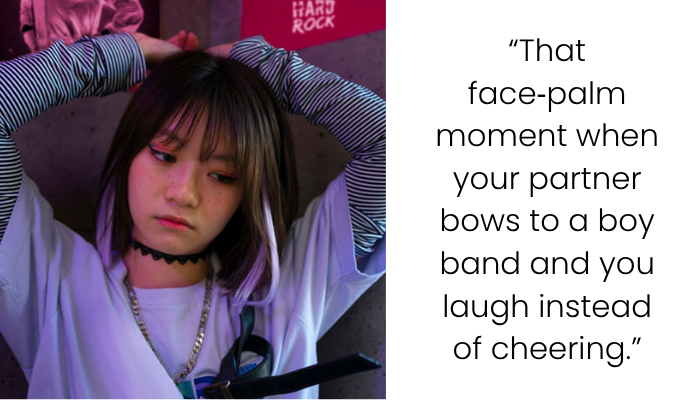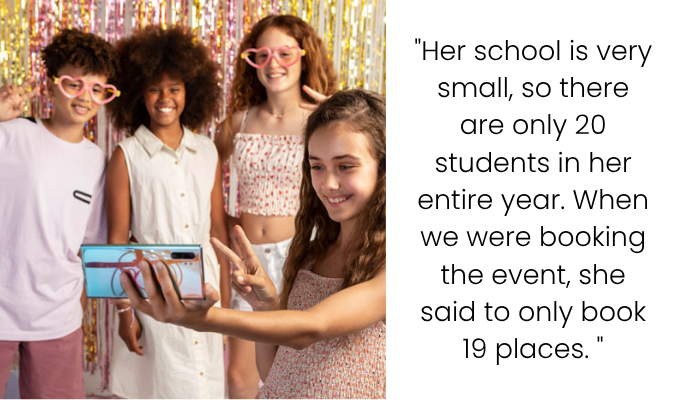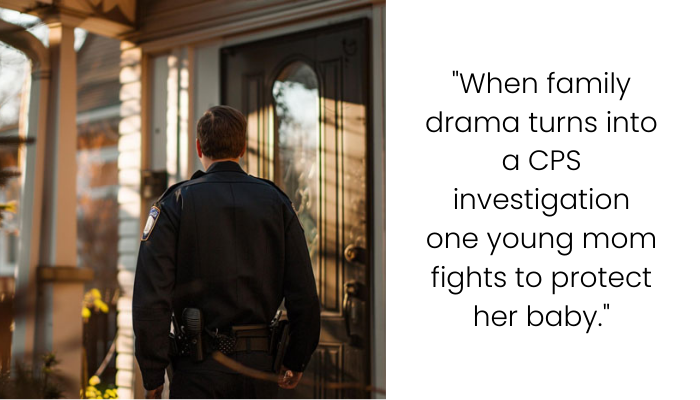Guy Publicly Mocks His Girlfriend For Fangirling Over A K-Pop Group Then Acts Shocked When She Gets Mad
My girlfriend (23 f) is a massive fan of the K‑pop group NCT. She won a contest to meet them, took me (22 m) with her as her plus‑one. She was visibly so excited: shaking in the car, crying during the meet‑and‑greet, bowing to them, etc. I wasn’t into it, felt embarrassed for her behaviour, but stayed quiet while it happened. Later, when she told her friends, I laughed at how awkward she was, joked about them probably laughing at her afterwards. Suddenly everyone went silent and she got upset.
Now a year later she’s bought expensive tickets for NCT (and a fan‑meet) with a friend, and when I offered to get a ticket so I could go with her (not to the fan‑meet, just the concert) she said she’d rather I didn’t — said she didn’t want me bored or embarrassed. I feel like she’s passive‑aggressive about that one joke I made ages ago. So: AITA for laughing at my adult girlfriend’s teenage‑fangirl antics?
When it comes to things people truly care about, like music, sports, or pop culture fandoms, respect often matters more than humor

The author’s girlfriend won a radio contest to meet K-pop group NCT and invited him as her plus one








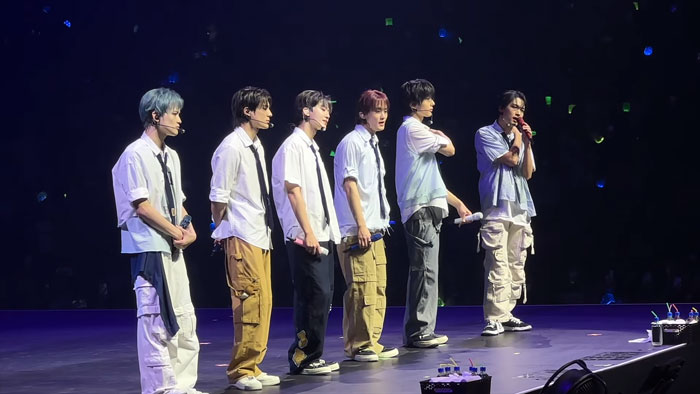


Okay, there’s a lot going on here: fandom culture, age expectations, partner respect, embarrassment, mockery, and how we handle someone’s passion when we don’t share it. I’ll unpack these in some depth, with research insights (yes there are studies on fandoms!) and relationship‑communication suggestions. If you keep reading, I’ll try to help you decide where you stand and what to do next.
1. Fandom isn’t just for teens — and mocking it may sting
First: you assumed that because your girlfriend is 23 and acting like a “superfan” of a K‑pop group (which you view as teenage‑ish), that automatically means her behaviour is “too much”. But studies on fandom culture suggest that adult fans are very real, valid, and part of the community. For example: a global survey found that while many K‑pop fans are younger, a large chunk (around 25–34 years old) also actively participate. INSIGHT by Balance Now+1 Another study of adult fandom in Malaysia found adult fans struggle with “age norms” and stigma around being a “fan” when you’re older. Participations
So: on one hand her excitement may appear “immature” to you, but from her perspective it’s probably a genuine, meaningful part of her life. When you laughed, you dismissed something that matters to her. That matters in a relationship.
2. Partner “respect for your passion” is important
In relationships, one key piece of emotional health is being able to respect and support your partner’s interests—even if you don’t share them. Your reaction (“I was embarrassed for her”) suggests you judged her and then made fun of her. That tends to erode trust and emotional safety. If you want your girlfriend to respect you when you care about something she doesn’t, you need to show similar courtesy.
3. Embarrassment vs mockery
Feeling second‑hand embarrassment for your partner is one thing. Acting on it by laughing with others at her (especially when she’s vulnerable, crying, bowing, etc) is another. When you told her friends about how she bowed and joked that the band probably laughed at her, that crosses into mockery territory. That’s less “I felt awkward” and more “I’m making fun of you”. It’s understandable you were embarrassed, but once you jokingly shared it and had fun at her expense, it changed the dynamic.

4. The “adult fangirl/age norm” tension
You said you “feel like she’s too old to put so much stock in k‑pop”. That’s a belief, and while it might reflect your feelings, it also reflects societal expectations (“Once you’re this age you shouldn’t act this way”). Research shows adult fans often contend with shame or judgement for keeping up youthful or niche interests. Participations So your laughter tapped into that shame‑norm for her.
5. What about the concert ticket‑offer and her reaction?
You offered to buy a ticket so you could attend with her (though not the fan‑meet). That shows you could care, or at least open to engaging. But her reaction (“I’d rather you didn’t go because I don’t want you bored/embarrassed”) feels like resentment or distance. She might still hold a grudge about the joke, or feel you don’t see her passion as valid. She anticipates judgement from you during the concert.
6. Was your laugh “harmless banter” or “relationship harm”?
Context matters. If you had teased her gently in‑private and both of you laughed, that’s different from mocking her in front of her friends/fandom setting and making a joke at her expense. The latter can feel like betrayal of emotional support. The fact that “everyone went silent and death‑glared at me” suggests she and her friends felt your joke crossed a line. That suggests your action did harm.
7. Does your behaviour justify her cold reaction now?
From your view: you made a joke a while ago, she now seems cold and excluding you from the next concert. Relationship theory says: when someone is hurt, they may withdraw, create distance, or set boundaries. Her response may be a sign she’s still hurt and unsure how you view her. So the coldness might not just be passive aggression—it might be protective.
8. What would a healthy response look like now?
Given what’s gone down, here are steps you might take:
- Acknowledge her passion: Let her know you see how much meeting the group meant to her, and you respect her fandom even if you don’t share the same intensity.
- Apologise for your role: You don’t have to apologise for feeling embarrassed or for not being into K‑pop. But you could apologise for laughing at her in front of others and making her feel small.
- Invite participation: Ask if she’d like you to attend the concert (or part of it). Be honest that you might feel out of place, but you’re open.
- Set boundaries: You might say you won’t commit to being a full‑on fan, but you’ll respect her space and excitement and won’t mock it.
- Check‑in with her: Ask how she feels about your reaction back then and what she needs now to feel supported.

9. Where does your “AH” call stand?
Putting it together:
- You weren’t malicious, you were embarrassed—but embarrassment is not an excuse for mockery.
- You laughed at her, not with her; that crossed into disrespect.
- She’s justified in feeling hurt and cautious with you now.
- If you genuinely value her, an apology and change of tone is the decent path forward.
So: Yes, you were in the wrong (i.e., you were being the AH) for laughing at her public fan‑moment instead of being supportive. You might not be the major AH (you didn’t sabotage her, you just acted poorly) but you’re definitely on the side of needing to make amends.
Netizens insisted the author was in the wrong for laughing at his girlfriend in the first place, and that she had every right to exclude him from this concert




